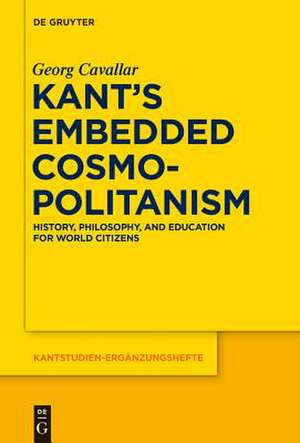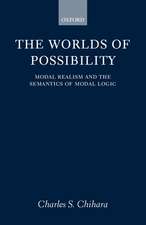Kant's Embedded Cosmopolitanism: History, Philosophy and Education for World Citizens: Kantstudien-Ergänzungshefte, cartea 183
Autor Georg Cavallaren Limba Engleză Hardback – 18 mai 2015
Din seria Kantstudien-Ergänzungshefte
-
 Preț: 111.14 lei
Preț: 111.14 lei - 18%
 Preț: 846.53 lei
Preț: 846.53 lei -
 Preț: 146.81 lei
Preț: 146.81 lei - 9%
 Preț: 608.55 lei
Preț: 608.55 lei -
 Preț: 112.78 lei
Preț: 112.78 lei - 9%
 Preț: 821.21 lei
Preț: 821.21 lei - 18%
 Preț: 640.99 lei
Preț: 640.99 lei - 9%
 Preț: 598.54 lei
Preț: 598.54 lei - 23%
 Preț: 984.46 lei
Preț: 984.46 lei - 23%
 Preț: 1072.62 lei
Preț: 1072.62 lei - 23%
 Preț: 1003.30 lei
Preț: 1003.30 lei - 23%
 Preț: 1007.75 lei
Preț: 1007.75 lei - 23%
 Preț: 849.81 lei
Preț: 849.81 lei - 23%
 Preț: 1010.42 lei
Preț: 1010.42 lei - 23%
 Preț: 855.73 lei
Preț: 855.73 lei - 23%
 Preț: 871.44 lei
Preț: 871.44 lei - 23%
 Preț: 853.51 lei
Preț: 853.51 lei - 23%
 Preț: 855.86 lei
Preț: 855.86 lei - 23%
 Preț: 854.39 lei
Preț: 854.39 lei - 23%
 Preț: 1007.44 lei
Preț: 1007.44 lei - 23%
 Preț: 852.63 lei
Preț: 852.63 lei - 23%
 Preț: 850.53 lei
Preț: 850.53 lei - 23%
 Preț: 1007.75 lei
Preț: 1007.75 lei - 23%
 Preț: 1314.75 lei
Preț: 1314.75 lei - 23%
 Preț: 1259.33 lei
Preț: 1259.33 lei - 23%
 Preț: 1236.66 lei
Preț: 1236.66 lei - 23%
 Preț: 735.87 lei
Preț: 735.87 lei - 23%
 Preț: 1390.31 lei
Preț: 1390.31 lei - 23%
 Preț: 1005.69 lei
Preț: 1005.69 lei - 23%
 Preț: 1538.80 lei
Preț: 1538.80 lei - 23%
 Preț: 1159.76 lei
Preț: 1159.76 lei - 23%
 Preț: 855.73 lei
Preț: 855.73 lei - 23%
 Preț: 848.90 lei
Preț: 848.90 lei - 23%
 Preț: 1083.17 lei
Preț: 1083.17 lei - 23%
 Preț: 1235.19 lei
Preț: 1235.19 lei - 23%
 Preț: 1079.16 lei
Preț: 1079.16 lei - 23%
 Preț: 1051.74 lei
Preț: 1051.74 lei - 23%
 Preț: 1387.66 lei
Preț: 1387.66 lei - 23%
 Preț: 1231.64 lei
Preț: 1231.64 lei - 23%
 Preț: 732.32 lei
Preț: 732.32 lei - 23%
 Preț: 1087.45 lei
Preț: 1087.45 lei - 23%
 Preț: 1082.72 lei
Preț: 1082.72 lei - 23%
 Preț: 1563.52 lei
Preț: 1563.52 lei - 23%
 Preț: 852.33 lei
Preț: 852.33 lei - 23%
 Preț: 851.58 lei
Preț: 851.58 lei - 23%
 Preț: 852.16 lei
Preț: 852.16 lei - 23%
 Preț: 1081.67 lei
Preț: 1081.67 lei - 23%
 Preț: 849.06 lei
Preț: 849.06 lei - 23%
 Preț: 852.45 lei
Preț: 852.45 lei - 23%
 Preț: 1164.82 lei
Preț: 1164.82 lei
Preț: 979.60 lei
Preț vechi: 1272.20 lei
-23% Nou
Puncte Express: 1469
Preț estimativ în valută:
187.45€ • 196.61$ • 156.05£
187.45€ • 196.61$ • 156.05£
Carte tipărită la comandă
Livrare economică 01-15 aprilie
Preluare comenzi: 021 569.72.76
Specificații
ISBN-13: 9783110438499
ISBN-10: 3110438496
Pagini: 225
Dimensiuni: 155 x 230 x 19 mm
Greutate: 0.45 kg
Editura: De Gruyter
Colecția De Gruyter
Seria Kantstudien-Ergänzungshefte
Locul publicării:Berlin/Boston
ISBN-10: 3110438496
Pagini: 225
Dimensiuni: 155 x 230 x 19 mm
Greutate: 0.45 kg
Editura: De Gruyter
Colecția De Gruyter
Seria Kantstudien-Ergänzungshefte
Locul publicării:Berlin/Boston
Notă biografică
AD>
Georg Cavallar, University of Vienna, Austria.

















